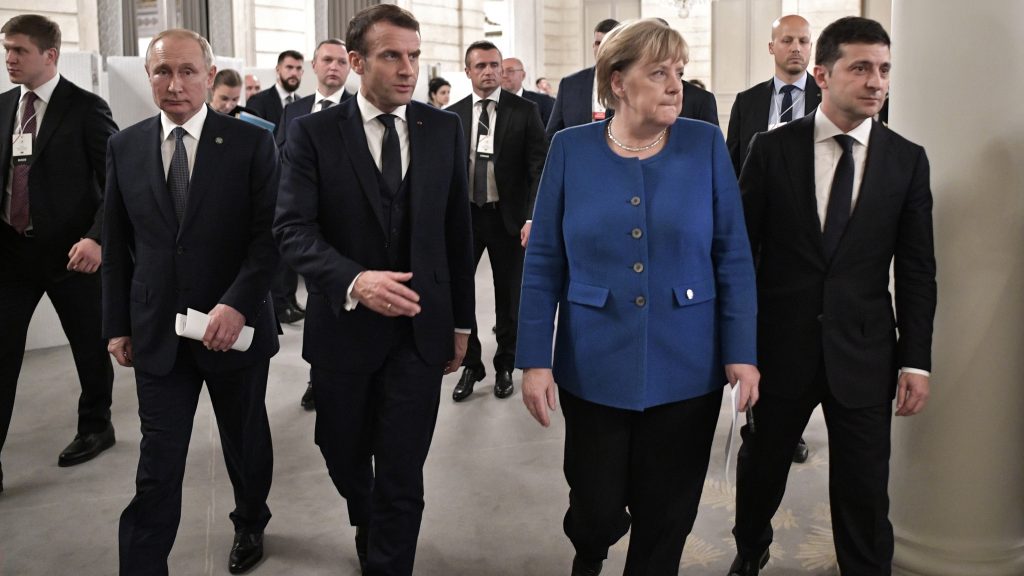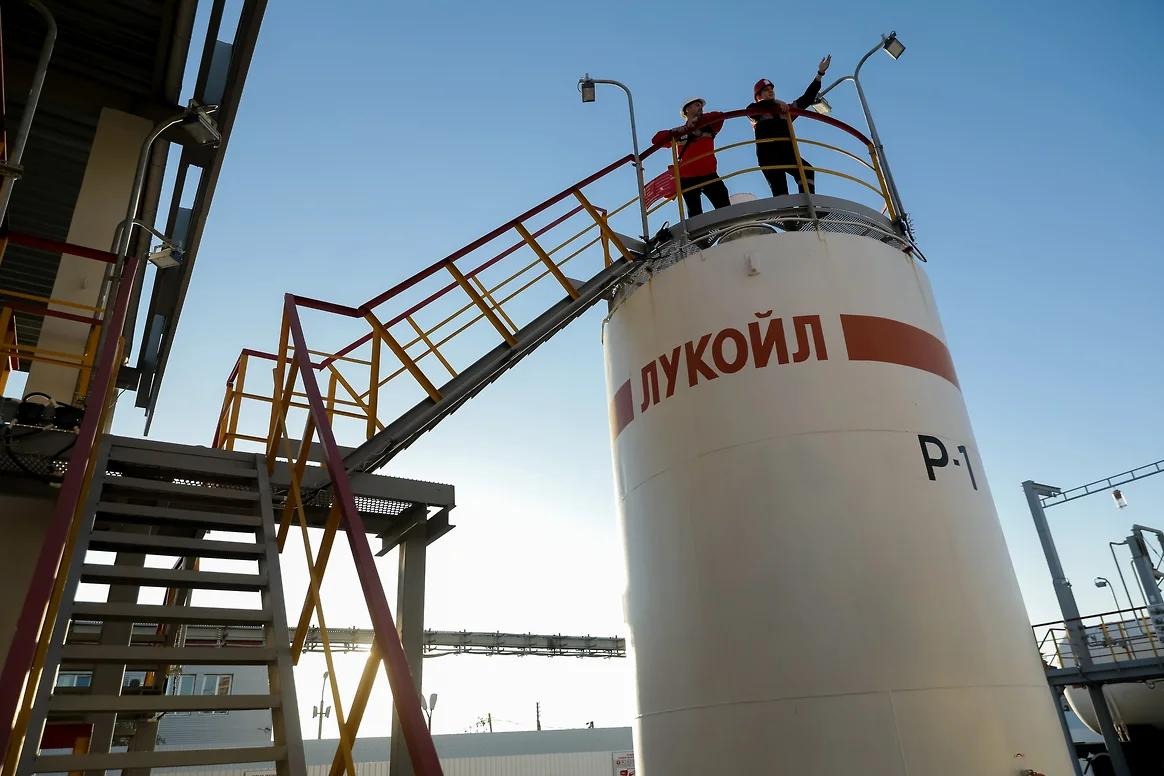
Yermak’s Earlier Giveaways Come Back to Haunt Zelenskyy and Ukraine
Yermak’s Earlier Giveaways Come Back to Haunt Zelenskyy and Ukraine
Russia abandoned the ceasefire in Ukraine’s east in early February (see EDM, February 18) and persists with low-intensity positional warfare to date, killing and wounding several Ukrainian soldiers every week. Ukraine responds with unilateral self-restraint, lest it be accused of breaching itself the ceasefire or “provoke” Russia into escalating and inflicting more Ukrainian casualties (see EDM, March 15). Exploiting the Ukrainian Presidential Office’s unconcealed nervousness in the face of casualties, Moscow aims to extort political concessions from it in return for promises to respect the ceasefire afterward (promises neither kept nor enforceable).
Moscow’s immediate political objective is to coerce Ukraine back into compliance with the July 2020 agreement on Additional Measures to Strengthen the Ceasefire. Primarily engineered by Presidential Office chief Andriy Yermak, that agreement elevated Russia’s proxy forces in Donetsk-Luhansk to co-equal status with Ukraine’s Armed Forces as parties to this agreement; it established a mechanism for regular interaction between the Ukrainian military and Donetsk-Luhansk’s forces; allowed the latter to have a voice in the Ukrainian military’s decisions on how to respond to ceasefire violations; and, as a cumulative effect, it exempted Russia from responsibility for any ceasefire violations (see EDM, July 29, 30, August 5, 6, 2020).
Russia’s proxies soon overplayed their hand in trying to exploit that success propagandistically, which helped Kyiv to withdraw from that agreement in September 2020, albeit without canceling it. The failure to terminate it outright, traceable to the Presidential Office, encouraged Russia to pressure Ukraine to recommit to that agreement. Breaching the ceasefire to inflict Ukrainian casualties, Moscow aims to reconfigure the ceasefire terms to its own advantage and also to extract Ukrainian political concessions in the Minsk Contact Group (see EDM, March 24, 2021).
On March 18, Yermak called for an extraordinary session of the Minsk working group on security affairs, to be held by videoconference immediately on March 19, in view of the (unattributed) “escalation” along the contact line. Yermak asked Russia, Germany and France (parties to the Normandy Four group alongside Ukraine) to collectively support Kyiv’s call for an emergency session of the Minsk security working group. Yermak hoped for that session “to elicit clear confirmation from the sides [unnamed] of their readiness to abide by the ceasefire regime in the Donbas.” He also asked the Normandy Four to adopt a joint declaration of their own about reinstating the July 2020 full ceasefire. “Ukraine is more interested in this than any other party because it is precisely Ukrainian soldiers who are being killed,” he declared (President.ua.gov, March 18).
The Normandy Four group was holding a videoconference of its own on March 18 at the level of top political advisors. Russia’s representative, presidential administration deputy chief Dmitry Kozak, blocked Kyiv’s proposal (Normandy decisions necessitate unanimous consent). On March 19, Kozak addressed a letter to the other three Normandy parties, demanding, inter alia: a) Russia, Germany and France “to do their utmost, using their influence, so that the July 2020 Additional Measures to Strengthen the Ceasefire (see above) are observed in full, unconditionally, and without regard to any differences over other issues”; and b) to “obligate” Kyiv to bring Ukraine’s Defense Ministry into conformance with the Additional Measures, “without any exceptions or interpretations” (Interfax, March 20).
Kozak’s rejection of conditionalities, linkages, exceptions or interpretations all refer to Ukraine’s attempts to escape from the political implications of the July 2020 military agreement after having signed it. Those political implications were de facto recognition of the Donetsk-Luhansk military forces, their equivalence to Ukrainian forces in terms of that agreement, and the Donetsk-Luhansk command’s intrusion into the Ukrainian military’s decisions on responding to ceasefire violations.
Following Kozak’s veto to the Minsk Group emergency session, Yermak responded by letter that “Ukraine wants further discussions, any time and in any format, in order to reach substantive decisions to return to undeviating observance of the Additional Measures agreement.” Meanwhile, Kyiv would not accept other (unrelated) demands from Kozak’s letter. A bit of linkage after all (Ukraiynska Pravda, March 21).
Yermak’s appeal to the Normandy Four—in practice, to Russia via the Normany Four—sought relief from Russian fire by reinstating an agreement with the same Russia, one shaped on Russia’s terms from the outset. Yermak’s solicitation continued, equivocating on who „the sides“ actually are; and his petition advertised his own side’s political vulnerability to pressure by lamenting that it is “precisely Ukrainian soldiers” who are killed, whereas the situation obviously warranted pinning the responsibility on the Russian side.
This predicament illustrates how unilateral concessions to Russia come back to haunt Ukraine even when it tries to wiggle out of such agreements after signing them. They also haunt President Volodymyr Zelenskyy politically. Zelenskyy had in 2020 made a major political investment in demonstrating to Ukrainian public opinion that the ceasefire works and Ukrainian soldiers are no longer killed. The price for this was the Additional Measures agreement, seen perhaps as a temporary expedient from which Kyiv would somehow back out. Instead, it has emboldened Russia to use force in order to extract compliance; and in the process, it has deprived Zelenskyy of a domestic political trump card that he much valued.
Over the recent months, practically every week or two, the Ukrainian president expresses the hope for a Normandy Four summit to be held soon; he even predicts monthly that it will happen within the next month. It is plausible to infer that he hears this from advisors intent on pleasing the chief executive. Most recently, on March 9 and March 18, Zelenskyy told Ukrainian media that a Normandy summit is being prepared and that “it must happen. No more postponements.” If not held, the president said, he has informed his Normandy group counterparts that he would hold bilateral meetings with each of the Normandy leaders, one-on-one. The goal is “to stop the war and regain the territory and people there” (Ukrinform, March 9, 18).
Moscow, however, demands compliance with previous agreements as a precondition to any Normandy summit. Specifically, Ukraine must enshrine the concept of a special status for the Donetsk-Luhansk territory in the Ukrainian constitution and to incorporate the so-called Steinmeier Formula (see EDM, September 24, 25, 2019 and October 3, 2019) into Ukraine’s legislation. This was the price that Yermak agreed to pay in 2019 in order to pave the way for the Normandy Four’s summit in December that year. At present, the Kremlin’s spokesperson Dmitry Peskov, Kozak and Russia’s foreign ministry all insist that Kyiv must meet these preconditions to a Normandy summit (TASS, March 10, 19). President Zelenskyy, his government and the Ukrainian parliament have all declined to meet such terms. But the concessions made in the past—perhaps hoping to somehow renege on them afterward—continue haunting Zelenskyy and the country.


